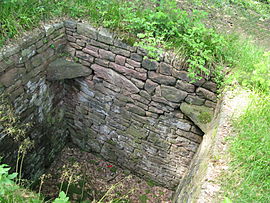Pitfall
A trap pit , also known as a trap or game pit , is a pit covered and camouflaged by branches or similar loose natural material for catching game .
It is the simplest and probably oldest type of trap .
nature
The pits, dug by hand, mostly covered with brushwood and camouflaged to catch wild animals, in Europe especially bears (bear pit), wolves ( wolf pit ) and foxes , were still used at the beginning of the 20th century .
A bear pit was usually five meters wide and deep and, besides being covered with brushwood, also thinly covered with grass and provided with bait (live sheep ) to attract the animal . The fox used a duck as bait .
Trap pits can also be provided with sharpened stakes to prevent the animals from jumping out.
If you wanted to keep the captured animal alive, you drove it through an exit of the pit with a trapdoor into a cage , which closed by itself through a similar door.
use
Pitfalls were used for large and well-fortified animals. Alfred Brehm reports on the history of hunting in Hungary , where the people caught bison in pitfalls.
Before the introduction of narcotics, numerous exotic wild animals such as elephants and giraffes were trapped in pitfalls for zoo supplies.
Animal welfare
In Germany and Austria, the creation of pitfalls is prohibited for reasons of animal welfare .
"Pitfalls" of animals and plants
The ant lion builds a pitfall in the form of a sand funnel, the angle of which is steeper than the angle of repose . Insects that get in trigger an avalanche and are thus briefly fixed before they grasp the animal.
Many calyxes used to catch insects have smooth walls and are so deep that insects that have got into them cannot climb out.
Trivia
A well-known proverb is: Whoever digs another pit, falls into it himself. ( Prov 26.27 EU ), also ( Ps 7.16 EU )
See also
- Lilia (Roman military pitfalls)


